Understanding the intricacies of international travel can be daunting, yet it’s essential for ensuring a smooth journey. The Transportation Security Administration (TSA) plays a pivotal role in this process, in particular for those entering or leaving the United States. The TSA enhances security, expedites travel, and ensures compliance with regulations, all with the goal of safeguarding the traveling public. Their rules and guidelines, which include what items are permitted in carry-on and checked luggage, are designed to prevent prohibited items from being brought aboard aircraft, therefore reducing potential threats to passenger safety.

Before embarking on international travel, passengers must be aware of the various Trusted Traveler Programs available, such as TSA PreCheck and Global Entry. These programs enable vetted individuals to undergo a more streamlined security process, thereby saving time at the airport. To participate, travelers need to go through an application process that includes eligibility checks, payment of applicable fees, and an in-person interview. Once enrolled, members enjoy benefits like expedited security lines and, in some cases, the ability to bypass traditional customs checks upon reentry into the United States.
Key Takeaways
- TSA is essential for security and efficiency in international travel to and from the U.S.
- Trusted Traveler Programs streamline the airport security process for approved passengers.
- Enrollment in these programs requires a process, including an application, fee, and interview.
Understanding TSA and Its Role
The Transportation Security Administration (TSA) plays a crucial part in the facilitation of secure air travel. Established under the Department of Homeland Security, TSA is responsible for the security of travelers in the United States.
TSA PreCheck
TSA PreCheck is a program that allows low-risk travelers to experience expedited security screening. Participants can keep on their shoes, belts, and light jackets, and leave laptops and compliant liquids in their carry-on bags during screening. This program is designed to enhance efficiency while maintaining high security standards.
Global Entry Program
The Global Entry Program is geared towards facilitating expedited customs clearance for pre-approved, low-risk international travelers upon arrival in the United States. Unlike TSA PreCheck, which is domestic, Global Entry also provides the added benefit of TSA PreCheck eligibility and is particularly efficient for international travelers looking to save time at U.S. airports.
Nexus and Sentri
In addition to TSA PreCheck and Global Entry, TSA recognizes two more programs as part of the Trusted Traveler Programs. NEXUS is a joint initiative between the U.S. and Canada designed to expedite border crossings for pre-screened, low-risk travelers. On the other hand, SENTRI is designed to expedite land border crossings between the U.S. and Mexico. Both programs include TSA PreCheck benefits and require a thorough background check by the Department of Homeland Security.
Eligibility and Application for Trusted Traveler Programs
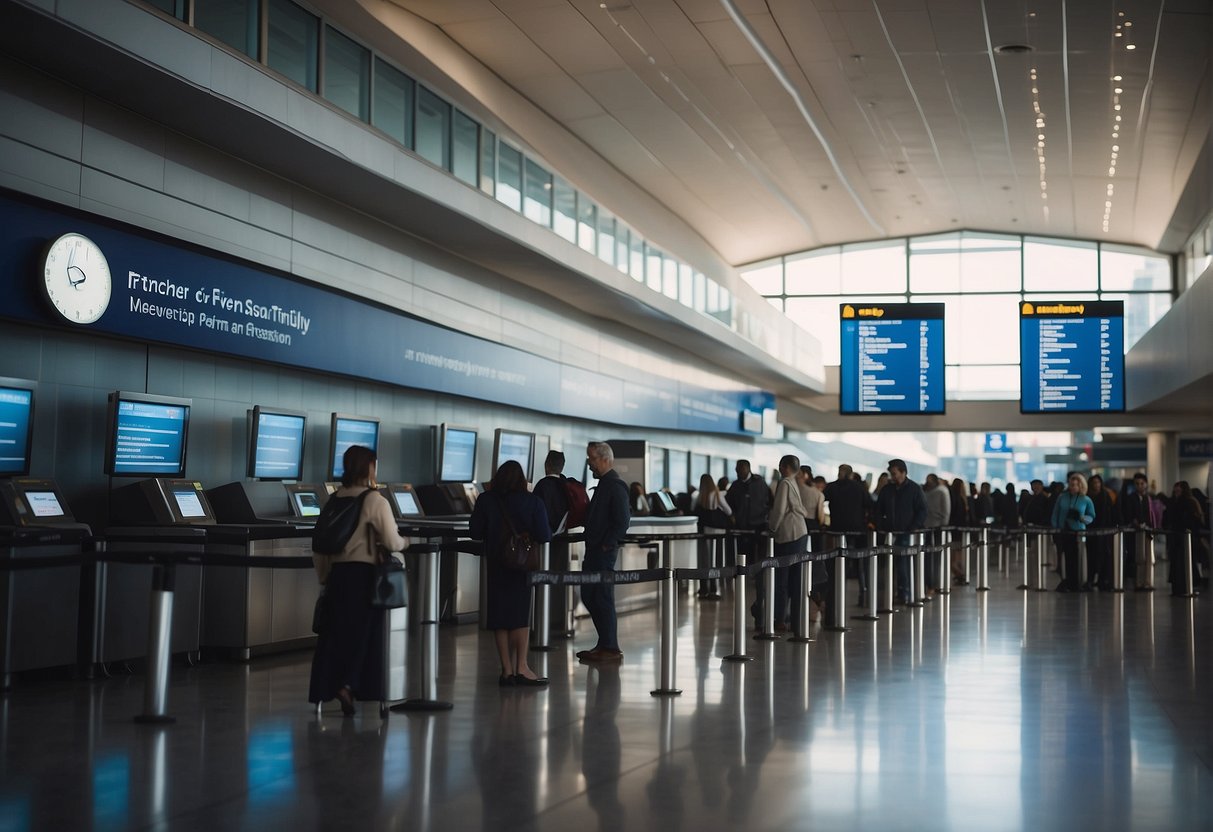
Trusted Traveler Programs offer expedited travel for pre-approved, low-risk travelers through dedicated lanes and kiosks. Understanding the eligibility requirements and application steps is crucial for a streamlined process.
Eligibility Requirements
Trusted Traveler Programs, including Global Entry, TSA PreCheck®, and others, are designed for U.S. citizens, U.S. lawful permanent residents, and certain foreign nationals. Applicants must have a valid passport and comply with the specific eligibility requirements of each program. This can include a thorough background check to assess risk and ensure traveler safety.
- U.S. citizens and lawful permanent residents can typically apply for these programs.
- Certain programs are also available to citizens of selected foreign countries.
Application Process
The application for a Trusted Traveler Program involves several steps, beginning with creating an online account. Applicants must fill out detailed forms with personal information, travel history, and possibly undergo an interview.
- Create an account with the Trusted Traveler Programs.
- Complete the online application, providing all necessary documentation, such as a passport.
- Pay the non-refundable application fee and await the results of the background check.
- If conditionally approved, schedule and attend an in-person interview.
- Receive final approval and enjoy the benefits of expedited travel.
Both eligibility and the application process can vary depending on the specific Trusted Traveler Program; travelers should ensure they meet the requirements for international travel. Once approved, these programs significantly simplify the travel experience, demonstrating a strong example of the benefits of pre-screening in bolstering security while improving passenger convenience.
Membership Benefits and Features
International travel can be streamlined significantly for members who take advantage of expedited security and customs screenings, along with a slew of other travel perks.
Expedited Security Screening
Members benefit from TSA PreCheck which grants them access to expedited security lanes at airports, greatly reducing the time spent during the security process. This program applies to U.S. travelers at domestic and international airports. By using a dedicated security lane, the screening process is faster as members are not required to remove shoes, laptops, liquids, belts, or lightweight jackets.
Enrollment on Arrival
For international travelers, the Global Entry program incorporates an Enrollment on Arrival feature, which streamlines the membership process. Travelers can complete their Global Entry interview as part of the immigration process upon arriving in the United States, with no prior appointment needed. This convenient option is available at select airports, aiding in expediting U.S. customs screening.
Other Travel Perks
In addition to the time saved at security checks, membership often includes additional travel benefits that enhance the overall travel experience. These may include reduced wait times, access to travel advisories, and help with understanding international travel regulations. Travelers should ensure they have the necessary travel accessories, such as an international travel adapter plug, which is essential for charging devices abroad, and staying connected through services like portable WiFi for international travel can keep members online without incurring excessive roaming fees. Moreover, to avoid communication issues, selecting an appropriate international travel SIM or exploring international travel phone plans is advised for seamless connectivity. Lastly, being aware of the carry-on dimensions can prevent any last-minute surprises at the airport, ensuring a smooth start to the journey.
Using Trusted Traveler Programs at the Airport
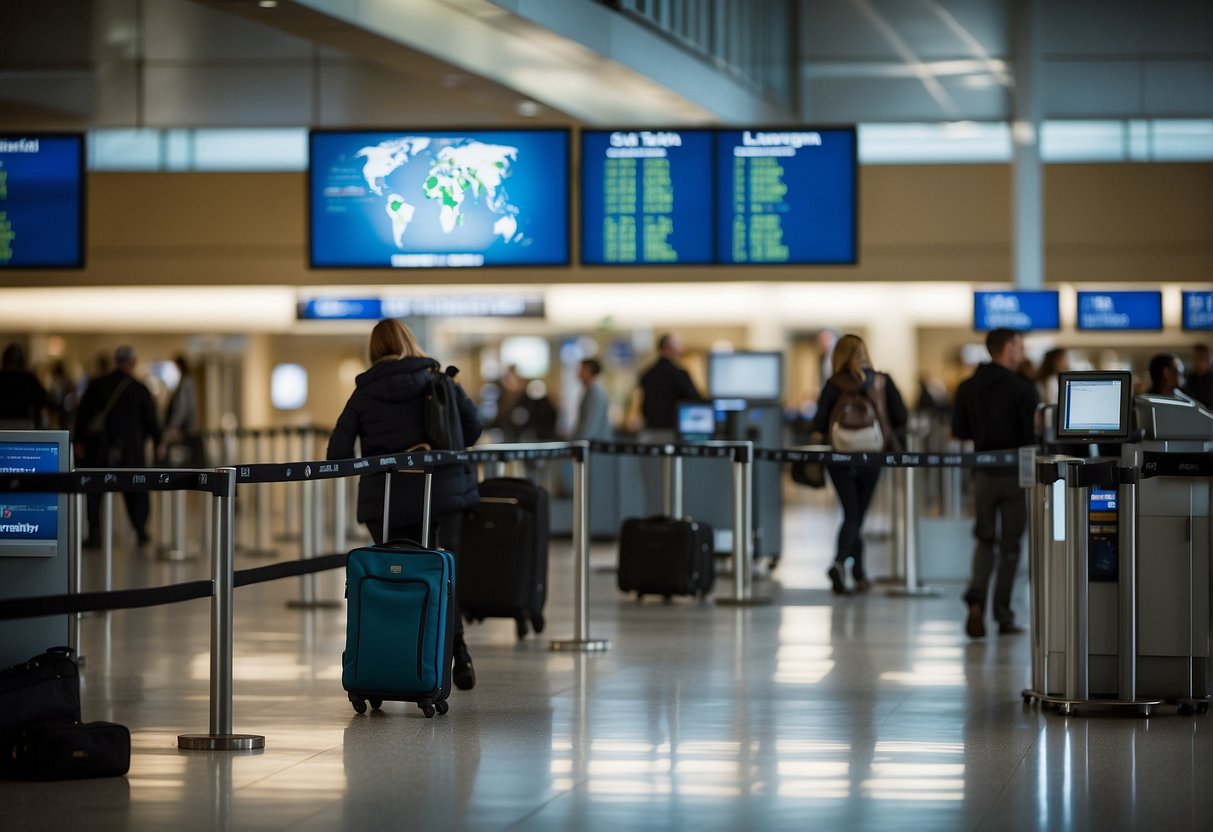
Trusted Traveler Programs such as TSA PreCheck and Global Entry, operated by the U.S. Department of Homeland Security, allow for a more streamlined airport experience, enabling quicker passage through airport security and customs procedures.
Security Procedures
TSA PreCheck affords passengers expedited security at U.S. airports. Enrolled travelers can proceed through security without needing to remove shoes, laptops, liquids, belts, and light jackets. It’s important to note that such travelers are subject to airport security measures which include a background check and fingerprinting. Expedited lanes are designated for TSA PreCheck members, simplifying the screening process and reducing wait times.
Customs Processing
Upon arrival in the United States, Global Entry members can bypass traditional U.S. customs lines and proceed directly to Global Entry kiosks. At these kiosks, members complete their customs form electronically, expediting their entry process. U.S. Customs and Border Protection operates these kiosks, which take a photo of the traveler, scan their passport, and collect customs declaration information, all within a few minutes. On completion, the kiosk issues a transaction receipt and directs the traveler to bag claim and the exit, thus significantly cutting down on processing time.
Enrollment and Interview
Travelers seeking expedited entry into the United States can benefit greatly from the Global Entry program, which requires a thorough enrollment process including a scheduled interview. Here’s how applicants can expertly navigate the interview stage.
Scheduling an Interview
Once a traveler’s application is conditionally approved, they need to schedule an in-person interview at a Global Entry Enrollment Center. The precise steps to arrange this appointment and the availability of interview slots can vary depending on the location. It’s essential to have all necessary documentation, including a known traveler number, ready before the interview.
What to Expect During the Interview
During the interview, various forms of identification are reviewed to verify the applicant’s identity and eligibility. The interview typically includes a review of the applicant’s travel history and may involve answering questions about their past travels and their purpose. Providing accurate and honest answers is crucial as they determine the decision on the application. After a successful interview, the traveler will receive their Global Entry benefits, including a known traveler number, to utilize when arriving in the US.
Compliance and Violations
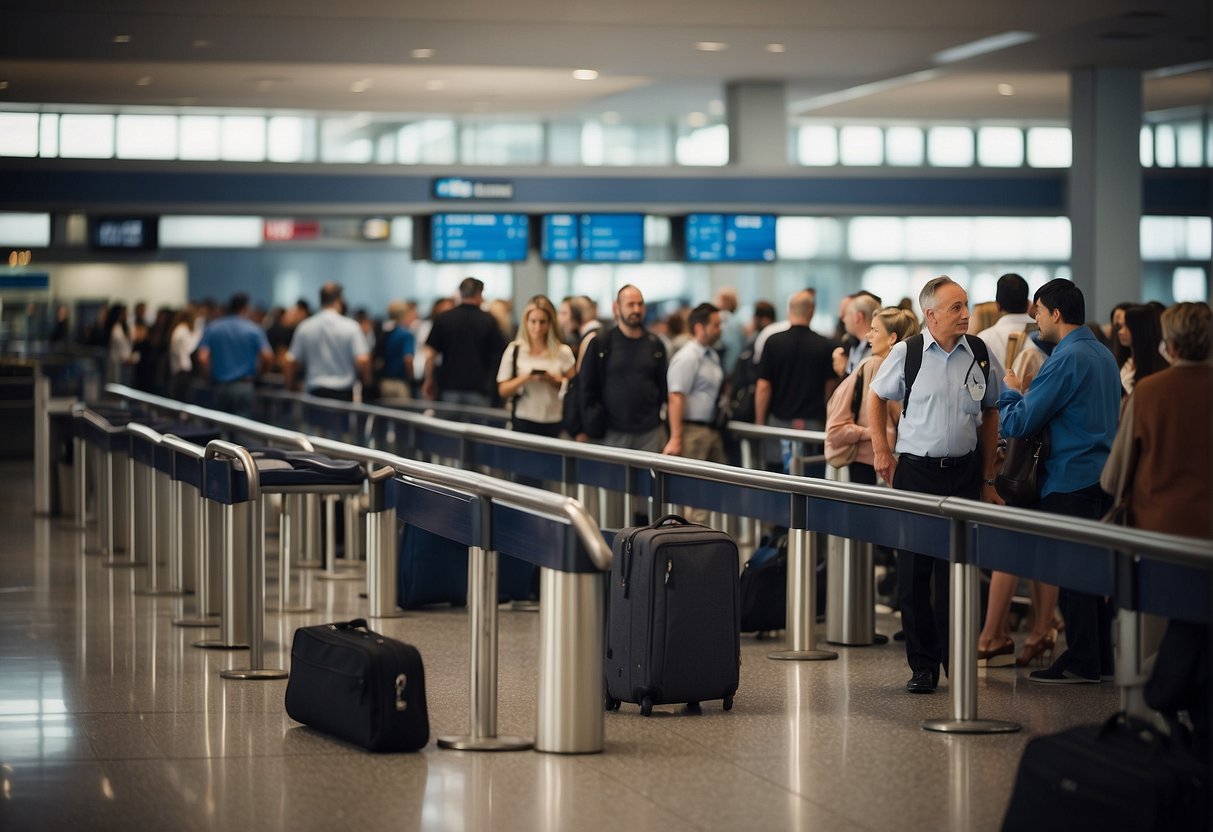
When traveling internationally, compliance with the Transportation Security Administration (TSA) guidelines is mandatory. Travelers are expected to adhere to the terms and conditions set forth by the TSA to ensure safety and efficiency in travel. Violations of these rules can lead to penalties, including fines and suspension from trusted traveler programs.
Adhering to Program Rules
Travelers enrolled in the Trusted Traveler Program (TTP), including TSA PreCheck and Global Entry, have consented to the program’s rules. They are often subject to less scrutiny at checkpoints, due to their pre-approved status. To maintain the integrity of these programs, lawful permanent residents and other travelers must ensure that all items in their possession comply with TSA regulations. Prohibited items, for instance, can lead to substantial fines.
Managing Violations
When a traveler is found to be in violation of TSA regulations, they may receive a Notice of Violation. The individual has a window of time to adequately respond to this notice, often up to 30 days from receipt. The response can determine the severity of the penalty, which can reach up to $14,950 per violation. Multiple repeat violations will result in higher penalties. Management of such incidents requires a clear understanding of the violation and adherence to provided instructions for response.
Payment and Fees
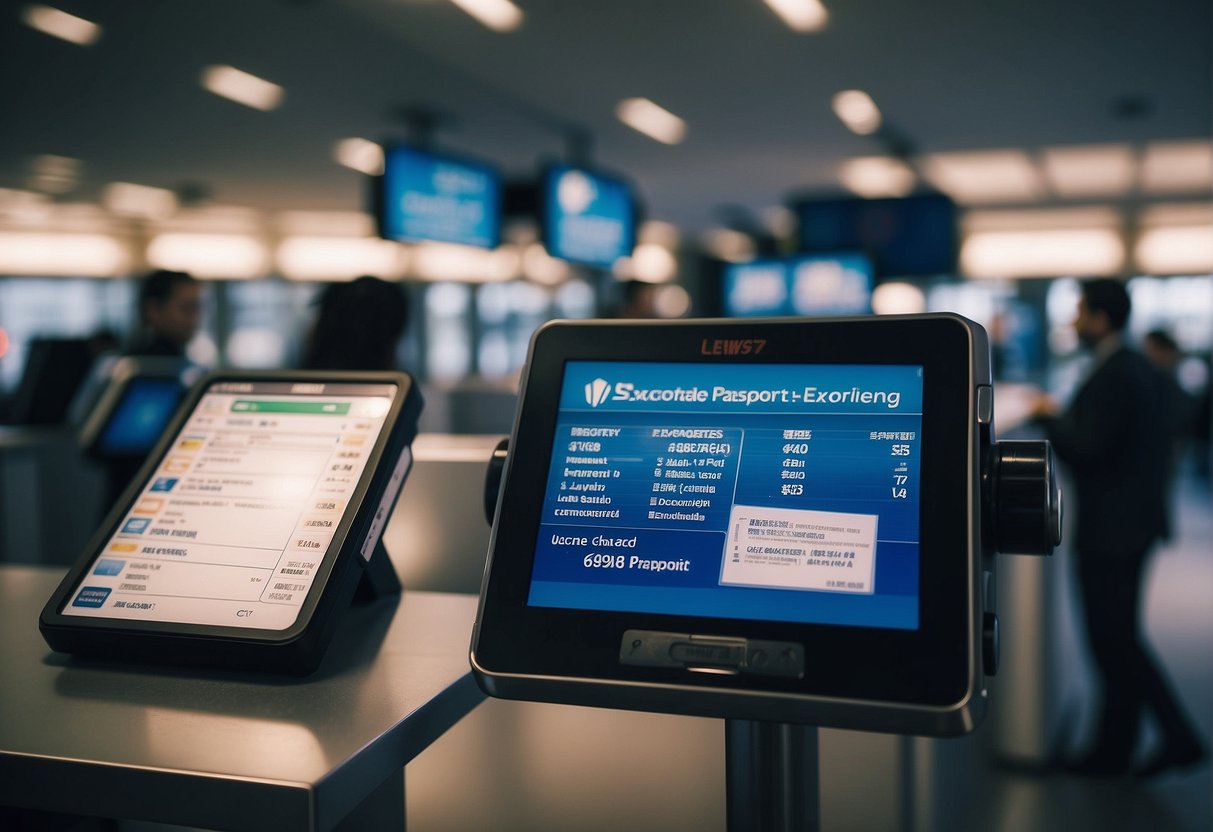
When applying for TSA’s trusted traveler programs, applicants should be aware of the associated costs and the potential for fee reimbursement through certain credit card benefits.
Application Fee Details
TSA PreCheck’s application process requires a fee of $78 for a five-year membership. When it’s time to renew, individuals can expect to pay a lower fee, typically around $70. Fees can vary depending on the service provider. For example, Global Entry, which includes TSA PreCheck benefits, costs $100 for a five-year membership.
Credit Card Partnerships
Various credit cards offer perks that include coverage of application fees for programs like TSA PreCheck and Global Entry. By utilizing these partnership benefits, one can effectively negate the cost of application or renewal fees. Some credit cards will provide statement credits that match the fee amount, thus offering a form of reimbursement to the cardholder.
Program Reciprocity and International Entry
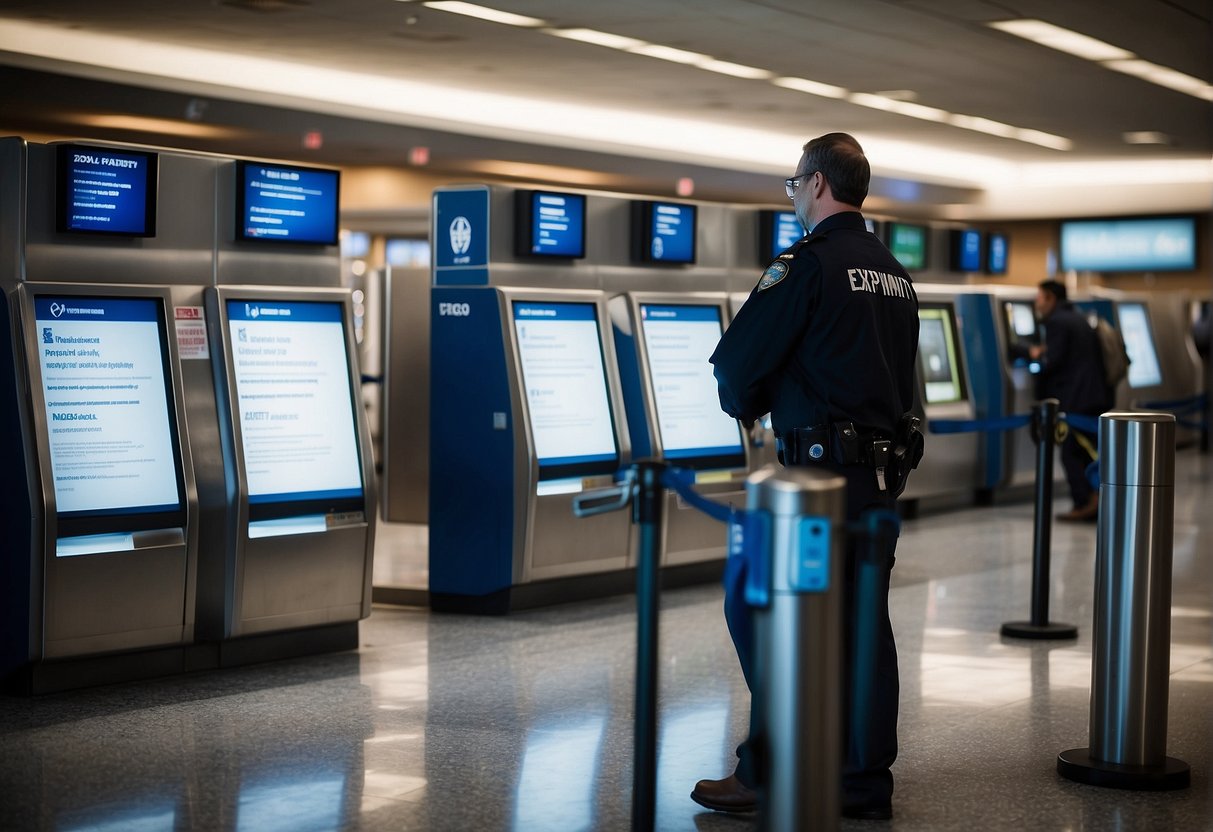
International travelers can benefit from expedited entry into the United States through programs like Global Entry, NEXUS, and SENTRI, which offer reciprocal benefits with neighboring countries like Canada and Mexico. These programs are designed to simplify the process of entering the U.S. for pre-approved, low-risk travelers from international destinations.
United States and Canada
Canada and the United States have a mutual agreement to facilitate quicker border crossings for travelers who are members of trusted traveler programs. The NEXUS program is a joint initiative that offers expedited processing at designated air, land, and marine ports of entry. By using dedicated processing lanes at land borders, NEXUS members experience reduced wait times. Additionally, Canadian citizens who are NEXUS members also receive the benefits of the Global Entry program, which includes access to TSA PreCheck® at airports across the United States.
For those regularly traveling to Canada, becoming a part of NEXUS is a practical step. It requires an in-person interview at a designated enrollment center, similar to Global Entry, where one’s eligibility for the program is assessed.
United States and Mexico
The relationship with Mexico involves a different trusted traveler program known as SENTRI (Secure Electronic Network for Travelers Rapid Inspection). This program allows for expedited clearance for pre-approved travelers when entering the United States from Mexico by land. Members of SENTRI may use dedicated lanes to avoid long queues at border crossings.
Additionally, Global Entry members can enjoy similar benefits when traveling from Mexico into the United States, with access to SENTRI lanes at land borders and use of Global Entry kiosks at airports for entry into the U.S. This is particularly advantageous for those who frequently visit Mexico for business or leisure, as it streamlines the process of international travel between the two nations.
Maintaining Trusted Traveler Status
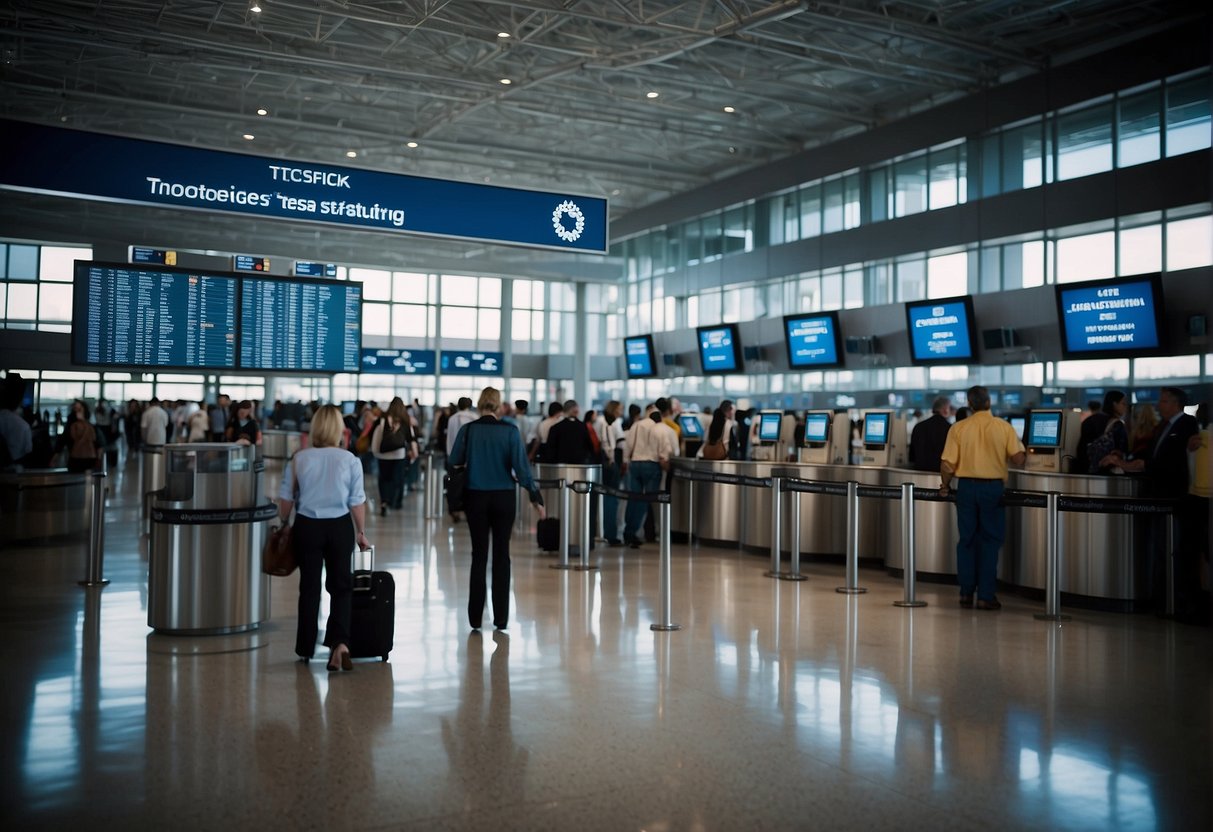
Trusted Traveler Programs, such as TSA PreCheck® and Global Entry, facilitate expedited security for pre-screened travelers. Key to enjoying these benefits is the maintenance of one’s membership status.
Renewal Process
Renewing membership in a Trusted Traveler Program typically requires action before the expiration date. Programs such as Global Entry will prompt members to renew their status, and failure to timely complete the renewal process may result in a gap in eligibility for expedited security. For certain programs, the renewal can be initiated online, and members should expect to provide updated information and, in some cases, undergo a new background check.
Keeping Information Up-to-Date
Maintaining the integrity of a traveler’s information is crucial for continued membership in Trusted Traveler Programs. It is imperative to update personal details, such as address changes or renewed passports, to avoid delays or revocation of trusted status. A Known Traveler Number, associated with the individual’s membership, must reflect current information to ensure the traveler continues to receive expedited security screening benefits. In the context of travel preparation and insurance, it is also wise to review and compare options for medical insurance for international travel, which is another critical component of a hassle-free travel experience.
Prohibited Items and Security Policies
When planning international travel, it is crucial for travelers to be aware of the Transportation Security Administration’s (TSA) prohibited items list and understand the security policies in place to ensure safe travel.
Prohibited Items
The TSA strictly enforces rules on what items can be carried on a plane and what must be checked. Travelers cannot bring weapons, explosives, and flammable items aboard an aircraft. Restrictions also apply to certain everyday objects, such as liquid limits for carry-on luggage, which are capped at 3.4 ounces (100 milliliters) per container. These items must be presented in a clear, quart-sized bag.
Examples of Prohibited Items for Carry-On:
- Firearms and ammunition
- Sharp objects (knives, scissors with blades longer than 4 inches)
- Sport equipment that can be used as a weapon (such as baseball bats or hockey sticks)
Examples of Prohibited Items for Checked Baggage:
- Explosive materials (fireworks, flares)
- Flammable items (fuels, gas torches)
- Chemicals (bleach, chlorine)
Allowed Items with Restrictions:
- Electronic devices (laptops, cameras) may be subjected to additional screening.
- Medications and special equipment (such as CPAP machines) require declaration and sometimes separate screening.
Security Policies
TSA security policies are designed to prevent threats during air travel. Passengers are subjected to screening procedures that include body scans and luggage x-rays. In certain cases, manual checks are conducted. Passengers must comply with the security checkpoint processes, including the removal of shoes, belts, and items from pockets, as well as placing electronic devices in separate bins.
Key Policies Include:
- Advanced Imaging Technology (AIT) for body scanning.
- 3D x-ray technology for bag scans to reveal in-depth images of the contents.
Passengers with disabilities or medical conditions can request assistance or exemptions from certain protocols, but they must inform officers beforehand and provide appropriate documentation as required.
Frequently Asked Questions
International travel involves careful planning, especially when it comes to airport security. The Transportation Security Administration (TSA) offers several services to facilitate smoother security screening for international travelers. This section addresses common inquiries regarding TSA services for those flying abroad.
What are the requirements for international travelers using TSA services?
International travelers must ensure they have all the necessary travel documents, including a passport that remains valid for six months beyond the period of their intended stay. They should also check TSA’s guidelines to ensure compliance with security requirements before reaching the airport.
How do I apply for TSA PreCheck for international flights?
Enrollment in TSA PreCheck for international flights involves an application process, which includes a background check and fingerprinting. PreCheck is available for U.S. citizens and lawful permanent residents traveling on participating airlines.
What are the differences between Global Entry and TSA PreCheck?
TSA PreCheck provides expedited security screening benefits for flights departing from U.S. airports, while Global Entry offers expedited U.S. customs screening for international air travelers when entering the United States, in addition to all the benefits of TSA PreCheck.
How can I log into my Global Entry account?
Global Entry members can log into their account through the Trusted Traveler Program website to manage their Global Entry membership, update personal information, or check the status of their application.
What are the costs associated with TSA PreCheck for international travel?
TSA PreCheck enrollment requires a non-refundable fee, which covers a five-year membership. Fees are subject to change, and travelers should refer to the official TSA website for the current cost and payment methods.
How does TSA PreCheck benefit international travelers compared to standard security procedures?
TSA PreCheck offers travelers expedited security screening where they do not need to remove shoes, laptops, liquids, belts, or light jackets. This can significantly reduce wait times and improve the airport experience, especially for those who travel internationally frequently.
Leave a Reply